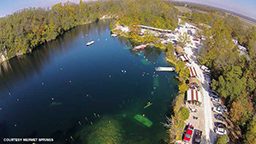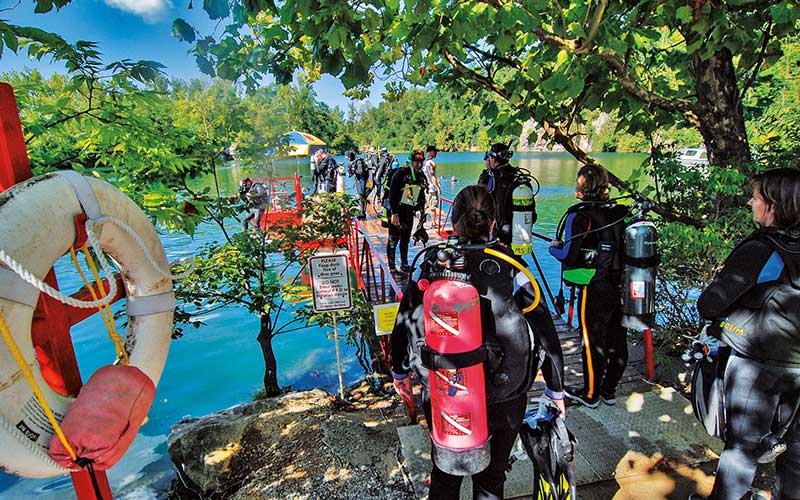The desperate shouts for help from the quarry’s surface halted every other activity, and all heads turned toward the commotion. When those on shore heard the words “unresponsive diver,” they rushed to help, but the response of the Mermet Springs staff was the most impressive. Well-rehearsed commands from two-way radios echoed from the quarry walls, and within seconds an all-terrain vehicle (ATV) loaded with a DAN oxygen unit roared toward the primary dock.
A rescue swimmer split the water and began moving machinelike toward the stricken diver, while staff in the office called 911. When the rescue swimmer reached the unconscious diver, he immediately secured an emergency ring around him, and the staff on shore hauled on the rope, rapidly bringing the diver to the dock. They administered rescue breathing and chest compressions, while a second ATV raced to the highway to guide the approaching ambulance to the scene. The Mermet Springs office provided telephone updates to the emergency personnel en route, and in what literally seemed like seconds the injured diver was on his way to hospital care.
Unfortunately, not every dive goes as planned, and not every day ends with laughter around the campfire. The unfortunate reality is that accidents do happen, and with an average of 5,000 to 7,000 divers visiting Mermet Springs each year, emergency preparedness and response are essential aspects of doing business. Owner Glen Faith knows the impossibility of preventing every single accident, but it is his unrelenting commitment to mitigating those incidents that sets his facility apart.
Mermet Springs, a dedicated diving quarry in southern Illinois, boasts numerous underwater attractions, including a Boeing 727 used in the film U.S. Marshals. While the underwater features and plentiful fish life bring in the divers, the quarry’s management also makes sure to prepare the staff for emergencies so the divers can feel safe.

Faith’s background with the Illinois Secretary of State Police taught him a lot about the value of teamwork and following protocol. He selects his staff in part for their abilities as divers and in part for their willingness to embrace the seriousness of dive safety and teamwork. Each staff member is evaluated during safety training, which includes “live” drills three to four times each season, and staff are assigned where their particular skills are most useful. Faith’s personal attention to diver well-being guides operations at the quarry. “That’s why everything we do at Mermet Springs is based on safety and being prepared,” Faith said.
Emergency preparation is a major part of what has made Mermet Springs one of the most popular destinations for dive shops across the Midwest. Owners and instructors know they can bring groups to a location at which a well thought-out emergency action plan is in place and is constantly being reviewed for ways to improve it. This preparedness and forethought even went into tiny details such as the length of throw ropes (to maximize coverage) and the color of staff shirts (to enhance visibility).
“The throw ropes are something I wish every dive destination like ours would consider using,” Faith said. “We have placed permanent posts at each of our four entrance docks. The coiled ropes are inside protective covers and are attached to throw rings, instantly available for use. We even measured the distance across the quarry based on the rescuer’s ability to throw the rings so we know just how closely the rescue swimmer needs to get to maximize the response capabilities of our staff and equipment in an emergency.”
Some of the quarry’s safety protocols have also become popular among divers for other reasons. The underwater recall system can broadcast announcements from the two-way radios to help locate missing or separated divers, but it’s often used to broadcast music for the entertainment of divers. “That underwater recall system is a special feature at Mermet Springs,” Faith said, “and it’s good for more than just playing Jimmy Buffett music.”

When emergency response is made as accessible and efficient as possible, it’s much easier for divers to embrace the culture of dive safety. Divers are more apt to remind each other to be cautious and to watch out for each other with increased vigilance. That culture is fostered by the friendly and vigilant nature of the staff at Mermet Springs, and the personal interest in safety shown by the owner and staff makes people feel they are not just customers but friends. “When people understand that you care about them and not just running a business,” Faith said, “they’re willing to listen to what you have to say and why you’re saying it. My staff does not hesitate to address potential hazards, and divers appreciate the attention to their safety.”
There are people and places in the dive industry that stand out as exceptional; Glen Faith and the staff of Mermet Springs are exceptional in their commitment to diver safety — especially when a dive does not go as planned.
© Alert Diver — Q1 Winter 2015